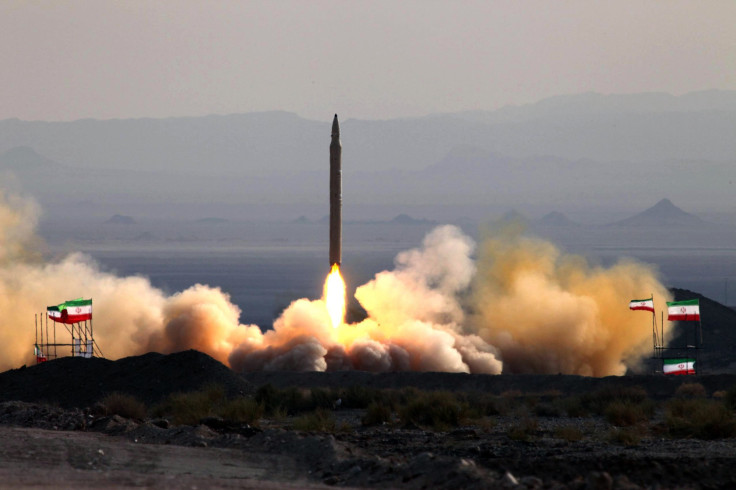Iran Unveils Upgraded Ballistic Missile With Extended Range, Raising Concerns For Israel
KEY POINTS
- The Kheibar missile can allegedly carry a 3,300-pound warhead
- The launch comes amid tensions between Iran and Israel
- US slams the missile program as a ''serious threat'' to international security
Iran unveiled a new version of a ballistic missile Thursday that reportedly has a range of 1,240 miles, raising concerns about the threat it poses to Israel, according to media reports.
The Kheibar missile, an upgraded version of Iran's longest-range missile to date, the Khorramshahr, is said to have the capability to carry a 3,300-pound warhead, as reported by The Associated Press.
During a live broadcast on state television, the missile was showcased alongside a replica of the Al-Aqsa Mosque in Jerusalem's Old City.
Iran's Defense Minister, Mohammad Reza Ashtiani, said, "Our message to Iran's enemies is that we will defend the country and its achievements. Our message to our friends is that we want to help regional stability," according to Reuters.
This missile launch comes at a time of heightened tensions between Iran and Israel, with Israel threatening military action if Iran's uranium enrichment exceeds 60 percent.
Last month, the International Atomic Energy Agency confirmed that its officials found "particles" of enriched uranium at 83.7 percent at Iran's underground nuclear site in Fordow.
According to Iran's state news agency, IRNA, the Kheibar is a liquid fuel missile with a range of 2,000 kilometers and a 1,500-kilogram warhead. The state media also claimed that the missile can reach speeds of Mach 16 outside the atmosphere and Mach 8 inside the atmosphere.
Meanwhile, Israel's top military commander, Herzi Halevi, warned that Iran's actions could soon compel Israel to take action against its nuclear program. At a conference hosted by the Institute for Policy and Strategy of Reichman University in Herzliya, he commented, "Iran has made more progress in uranium enrichment than ever before. We are also closely examining other aspects of the [Iranians'] path to nuclear capability. Without going into details, there are possible negative developments on the horizon that could prompt action."
Tensions have further escalated as an opinion piece in The Hill reported that Russia may assist Iran in overcoming technical obstacles in producing and detonating a nuclear bomb in exchange for Tehran's partnership in supplying Moscow with drones for use in Ukraine.
Following the unveiling of the missile, the US criticized Iran's missile program, labeling it a "serious threat." State Department spokesman Matthew Miller, during a briefing, said, "Iran's development and proliferation of ballistic missiles pose a serious threat to regional and international security and remains a significant non-proliferation challenge. We continue to use a variety of non-proliferation tools, including sanctions, to counter the further advancement of Iran's ballistic missile program and its ability to proliferate missiles and related technology to others,'' The Times of Israel reported.
Concerns have grown about Iran's nuclear activities as the country's missile program poses an impending threat, which was not directly addressed in the 2015 agreement abandoned by former US president Donald Trump.
Recently analyzed satellite imagery by The Associated Press revealed that Iran's new nuclear facility, located near the peak of the Zagros Mountains in the central part of the country, is reportedly so deeply entrenched that it may be beyond the reach of US weapons.
In 2018, Trump withdrew the US from the multilateral nuclear deal that imposed strict limits on Iran's nuclear program. President Joe Biden has continued to enforce strict sanctions against Iran.
Miller emphasized the commitment to prevent Iran from acquiring nuclear weapons, stating, "An Iran with a nuclear weapon would likely act even more provocatively, and that's why we are so committed to preventing Iran from acquiring nuclear weapons."

© Copyright IBTimes 2025. All rights reserved.





















